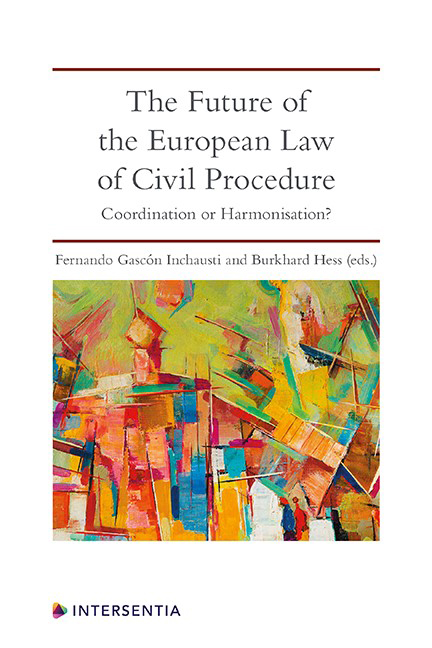Book contents
- Frontmatter
- Contents
- List of Cases
- List of Authors
- Introduction
- PART I METHODOLOGICAL APPROACHES
- PART II THE CURRENT SITUATION: VERTICAL AND HORIZONTAL HARMONISATION
- PART III CURRENT INITIATIVES FOR FURTHER HARMONISATION: The ELI/UNIDROIT Project
- The 2017 Directive Proposal on Common Minimum Standards of Civil Procedure
- Index
- ABOUT THE EDITORS
A Final Comment on the Future Evolution of Civil Procedure in Europe
Published online by Cambridge University Press: 23 July 2020
- Frontmatter
- Contents
- List of Cases
- List of Authors
- Introduction
- PART I METHODOLOGICAL APPROACHES
- PART II THE CURRENT SITUATION: VERTICAL AND HORIZONTAL HARMONISATION
- PART III CURRENT INITIATIVES FOR FURTHER HARMONISATION: The ELI/UNIDROIT Project
- The 2017 Directive Proposal on Common Minimum Standards of Civil Procedure
- Index
- ABOUT THE EDITORS
Summary
I must confess that I am a bit sceptical and pessimistic as far as the harmonisation of national rules of procedure, reached via the initiatives of EU institutions, is concerned. I do agree that on a few basic principles of civil procedure (such as access to justice, fairness, equality of arms) the differences between domestic procedural systems are not so remarkable; certainly, though, there are areas in which the differences are truly striking. But before addressing this point, I would like to review a question, one that other contributors to this book, too, pose in their chapters: What does “harmonisation“ mean ? Certainly harmonisation is an “ambiguous and imprecise“ concept, just like the synonym of harmonisation “approximation“ is: both terms, besides the obvious reference to the idea of an alignment of national legislations to the acquis communautaire, leave much room for defining which kind of harmonisation has taken place in the EU, a spontaneous one or a policy-driven one.
But this is not the first point on which I would like to expand. The first point is encapsulated in the following question: To what level is harmonisation desirable and, most of all, to what level is it practically feasible ? My impression is that these days, more now than in the past, the push to harmonisation is oft en perceived as a push to homologation, and this is something that a few Member States fear or, more simply, dislike. In 1997, Professor Lowenfeld wrote an essay titled: “The Elements of Procedure: Are They Separately Portable ?“ He underlined that, contrary to the conventional wisdom – according to which procedural law plays a secondary role since it is simply ancillary to substantive law – the rules of procedure are the very ones that better embody the history, the culture, the societal developments and the values of a given legal system, well beyond the traditional divide between the civil law tradition and the common law tradition. This might explain why, in my opinion, harmonisation in the field of civil procedure is oft en seen as an attempt at homologation, and again something that a few Member States do not support, fearing that this will deprive them of their national identity.
- Type
- Chapter
- Information
- The Future of the European Law of Civil ProcedureCoordination or Harmonisation?, pp. 285 - 288Publisher: IntersentiaPrint publication year: 2020



